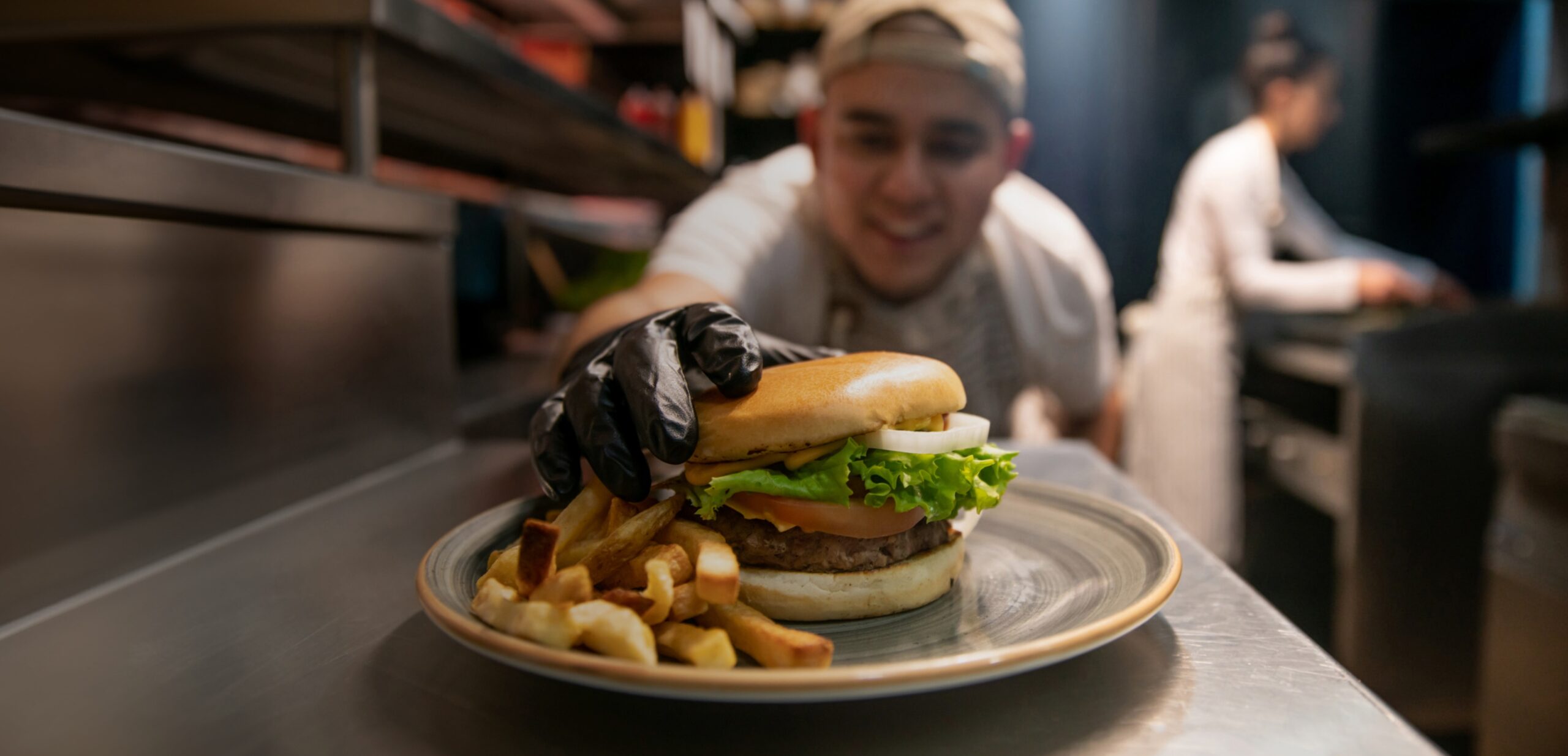
let’s dish
about
hospitality
Real talk from the people who work in the industry every day.
Industry Reality
sweet job. no sugarcoating.
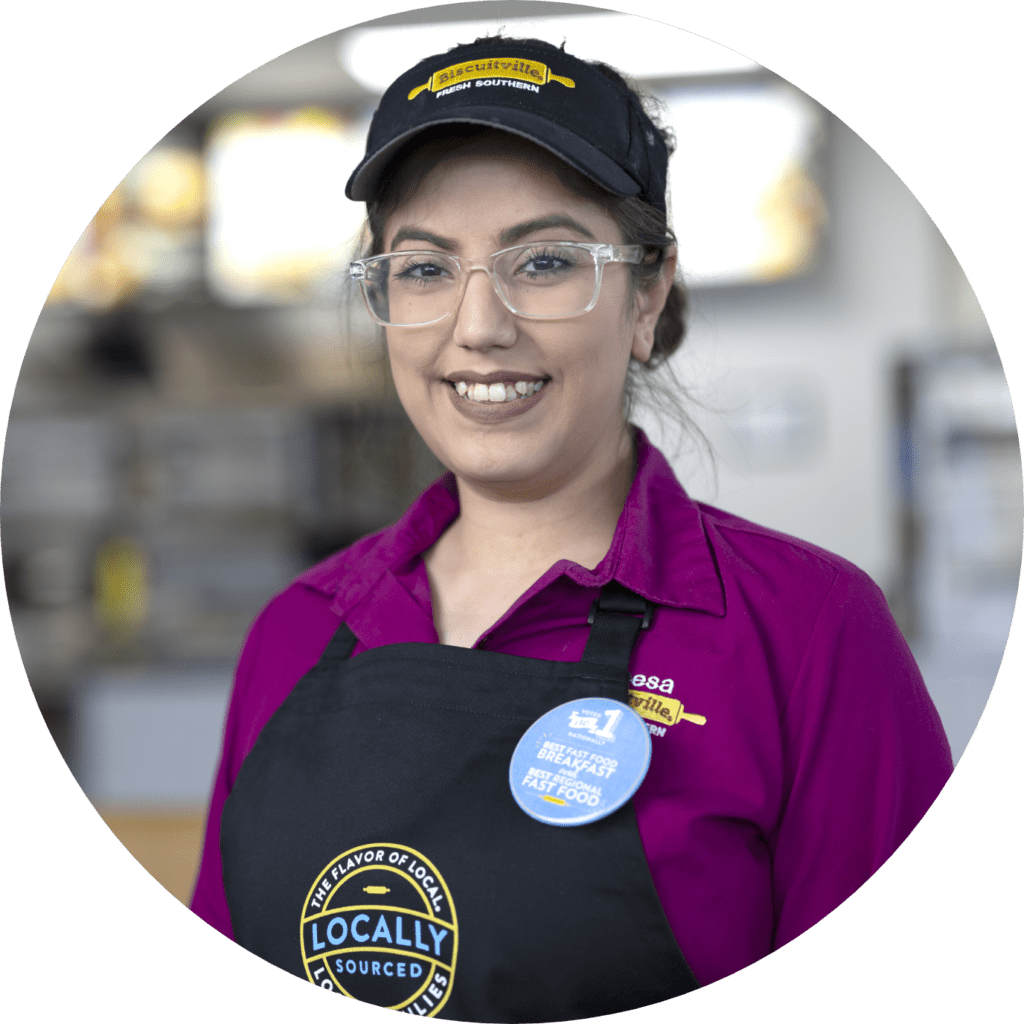
real talk:
FINDING Flexibility
Whether you’re looking for a second job to supplement your income or a job that accommodates your family needs or academic schedule, the hospitality industry offers a range of options.

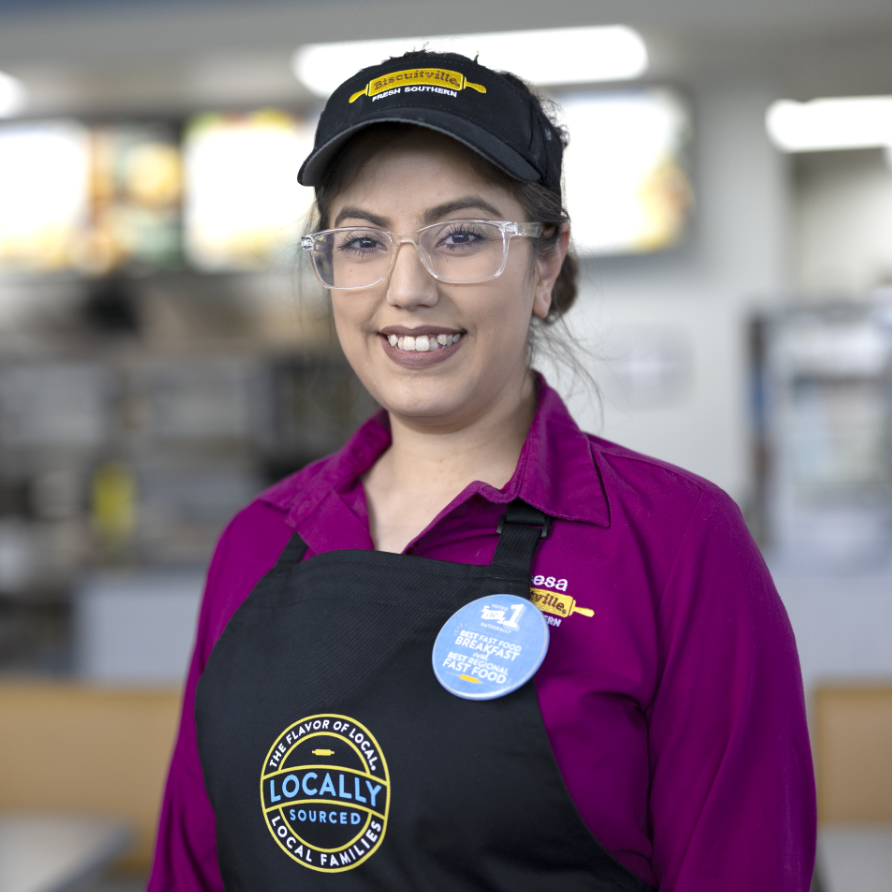
REAL TALK:
FINDING Flexibility
Whether you’re looking for a second job to supplement your income or a job that accommodates your family needs or academic schedule, the hospitality industry offers a range of options.
Several Crew Members at Biscuitville in Asheboro juggle family responsibilities or school with their workload. Biscuitville’s hours are a good match for them because the restaurant closes at 2 p.m., leaving the rest of the day for other pursuits. Store operator Jason Towery has worked in restaurants for most of his career. One of the things that drew him to Biscuitville was that he can be home by 3 p.m. His previous jobs were more demanding, with longer hours that often stretched into the evenings.
“You get every night home for dinner with the family, and you have plenty of time to cut the grass if you need to in the afternoon,” he says. “This is a fantastic place to work.”
Here’s how a flexible schedule benefits other Crew Members.
Vanesa Jaimes Bueno
Bueno began working at Biscuitville in 2012 and then left for a few years to care for her young children. She returned in 2020 to advance her career—and because the scheduling flexibility allows her to leave at 2:30 p.m. so she can pick up her son from school.
“I get to go home with my kids, play sports with them, and spend some time with my husband,” she says.
As a shift leader, Bueno trains new Crew Members, takes orders, assists with biscuits or cooking, and attends to anything else that arises. She’s taking online nursing classes, too, so her Biscuitville schedule also allows her time for schoolwork.
“This job is helping me in a lot of ways to improve myself,” she explains.
Ezariah Buncy
Buncy started working in fast food restaurants because they offer a flexible schedule that he could manage while in high school. Now that he’s enrolled at Randolph Community College, his Biscuitville hours allow him to study in the afternoon. The aspiring electrician wants to run his own business one day.
“You have the whole afternoon to do schoolwork. Or if you’re done with all of that, you have free time,” he says.
“You have the whole afternoon to do schoolwork. Or if you’re done with all of that, you have free time.”
Ezariah Buncy
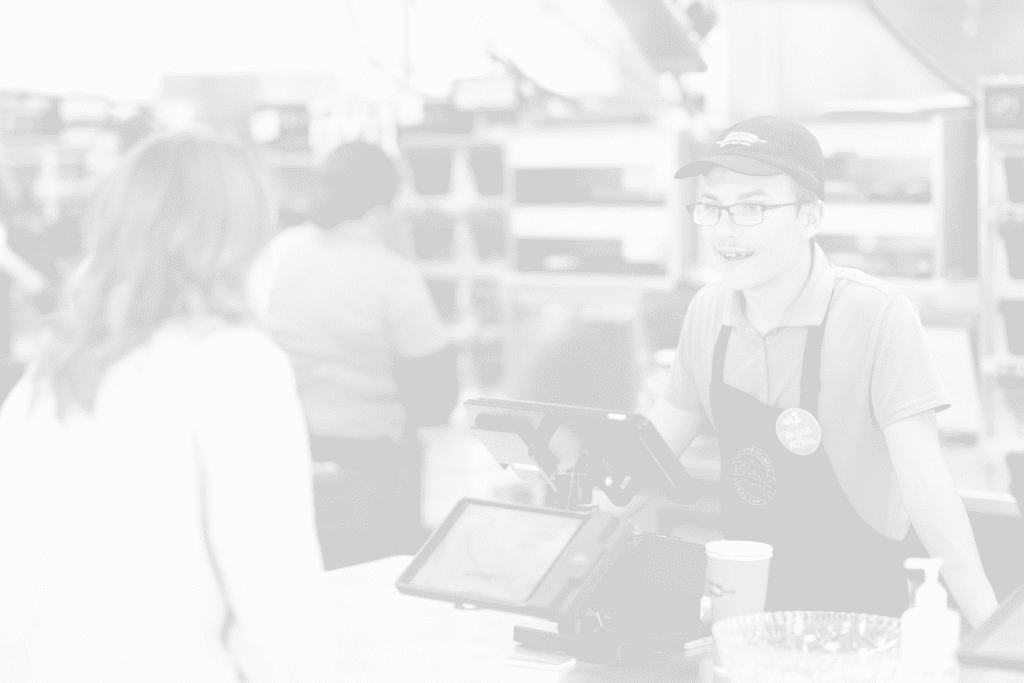
real talk:
Making money
At the end of a shift, what’s more satisfying than a job well done? Money. Because no matter how much you love your job, making money is the name of the game.

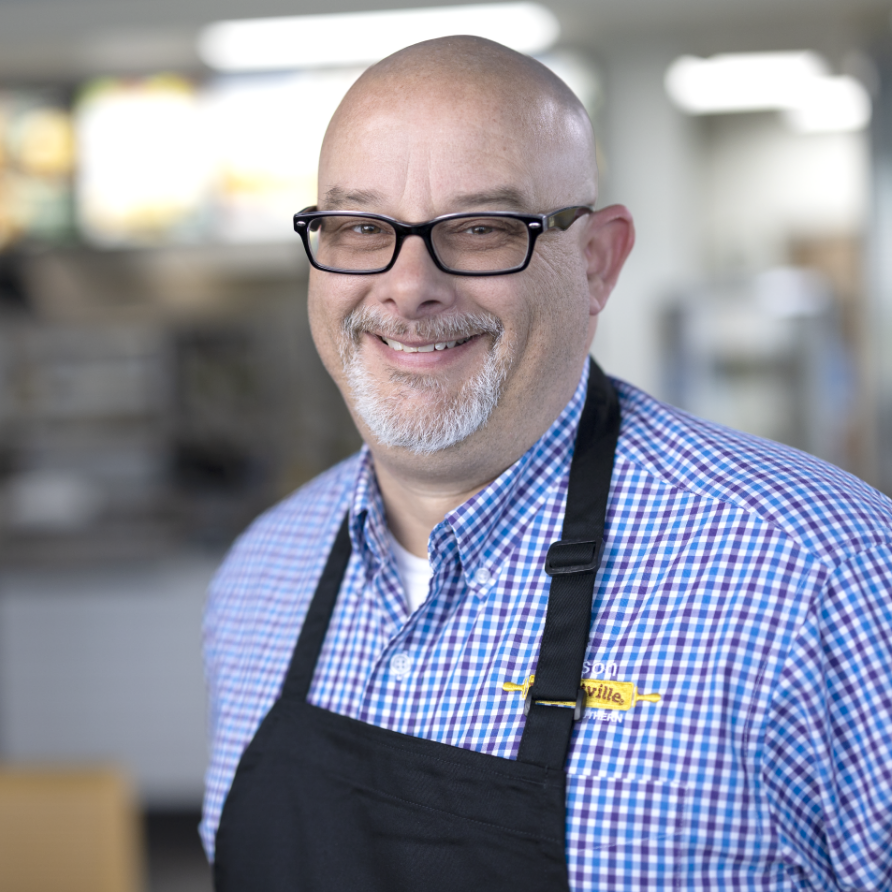
REAL TALK:
Making Money
At the end of a shift, what’s more satisfying than a job well done? Money.
Because no matter how much you love your job, making money is the name of the game.
Whether you’re starting out in quick service or working for tips, hospitality is one of those professions where the more you put into it, the more it pays off. Biscuitville store operator Jason Towery has worked in restaurants most of his career.
“I can say that working in this industry has afforded me the opportunity to do a lot of things with my kids that I never would have dreamed that I would do—going to Disney World several times, taking cruises, going on fantastic vacations, and building memories with my kids,” he says. “You can make it happen if you have a career in this industry.”
Towery recalls hiring one employee who walked to work until he earned enough money to purchase a bicycle. From there, he started saving to buy a car. He couldn’t wait to show it off.
“It was a brand-new shiny red Dodge Charger. He was very proud of that,” Towery recalls. “This young man was what I would consider a really tough young man, and he was actually moved to tears when he was telling me about how I had provided him this great thing to allow him to grow and make money at that restaurant.”
Whether your goal is to support your family or buy a car, a job in hospitality can help you accomplish your dreams.
“Working in this industry has afforded me the opportunity to do a lot of things with my kids that I never would have dreamed that I would do.”
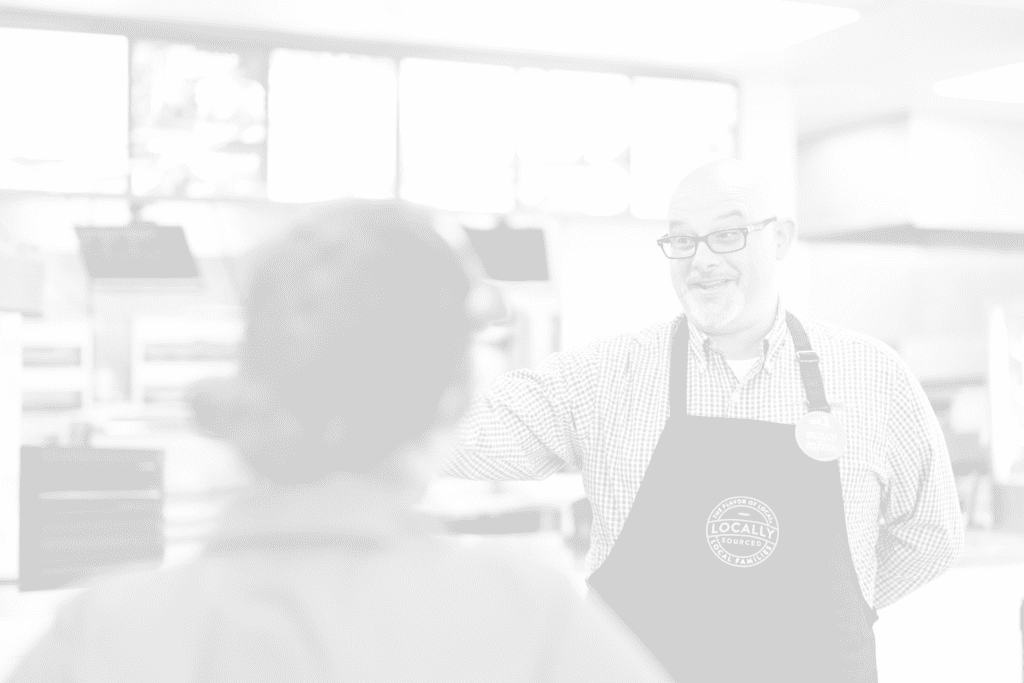


real talk:
burnout
Burnout prevention is an ongoing challenge for hospitality workers, particularly for those businesses that are open daily and around the clock.


REAL TALK:
BURNOUT
Burnout prevention is an ongoing challenge for hospitality workers, particularly for those businesses that are open daily and around the clock. Justin Ard is one of those restaurant professionals who have spent more time in restaurants than anywhere else. Since his first restaurant job at 14, he’s worked 10- to 12-hour shifts, sometimes longer, and often without days off.
After decades in the industry, Ard, who’s now front of house shift leader at Tastee Diner in Asheville set some boundaries when he accepted his current job offer. It took those years of learning and proving himself to feel he had earned the agency to do so, he says. Here’s what he said about burnout.
Q: When it comes to working insane hours, how much of it is an unverbalized, unwritten expectation, and how much of it is that this industry tends to attract people who are driven to work really hard and do so willingly without a sense of boundaries?
A: I think it’s 70, 30. I think it attracts those types of people most. There are some things that are unsaid because most people who gravitate to it are attracted to and can handle those types of environments.
I was fortunate enough to always have someone in the room with me who would say, “Hey, this is your choice. Again, you don’t have to do this. You don’t have to be here.” But what’s understood and what’s not said is the more you do behind the scenes and the more you’re willing to give, the greater chance you have of succeeding as a restaurant. It’s a very risky industry, that’s to say the least. Too many variables where you never know if you’re going to make any money that day. So, I think it’s more that it attracts those types of people for sure.
Q: You’ve had so many years in the industry of not setting boundaries, and now you’re in a role that allows you the same days off each week and paid time off. Can someone entering the industry ask for that off the bat, or do you have to earn it before you can set those boundaries?
A: It depends on the location. Also, I’m not just a server here, because when the plumbing breaks, I’m running to Lowe’s and buying the piece because I’m willing to be the plumber. That desire to go above and beyond, it’s learned through experience. But if you’re someone who has that engineering brain who asks why, who tries every possibility on their own before they call the professionals, you can demand what you deserve out the gate. Me personally, it took a lot of experience to learn these things. But between location and your work ethic, I mean, as long as you know who you are and you feel grounded in your work ethic, you can go for it.
“As long as you know who you are and you feel grounded in your work ethic, you can go for it.”

REAL TALK:
Ambition Over Fluency
In hospitality, language doesn’t need to be a barrier to success. If you have the ambition and drive to work hard and learn, you can launch a sustainable career.

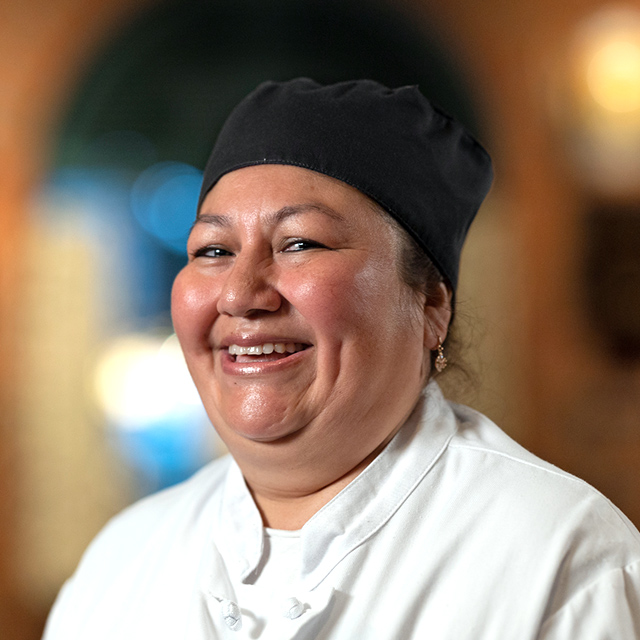
REAL TALK:
Ambition Over Fluency
In hospitality, language doesn’t need to be a barrier to success. If you have the ambition and drive to work hard and learn, you can launch a sustainable career. Just ask Angela Parada and Elvia Heiss, who are part of the culinary teams for Quaintance-Weaver Restaurants and Hotels. The Greensboro-based company includes O.Henry Hotel and Proximity Hotel, Print Works Bistro, Green Valley Grill, and Lucky 32 Southern Kitchen.
Angela Parada, 19 years at Green Valley Grill
Parada used to walk by the O.Henry Hotel and Green Valley Grill and dream of working there. Her primary language is Spanish, and she says it was difficult getting hired there because her English wasn’t very good. But finally, with her third application, she was hired. She’s been at Green Valley Grill 19 years and is currently a key culinary team leader. She not only prepares meals and sauces, but she also teaches Quaintance-Weaver’s culinary standards to others.
Although she speaks English hesitantly, she excels in her job because of her work ethic and desire to learn. Through the years, her roles have included food prep, pantry, salads, pastry, and events. She’s taken advantage of the opportunities to grow and develop her career, she says.
“I love my job. The days that I’m not here, I want to be working. I want to be here all the time,” she says.
Elvia Heiss, 22 years at Print Works Bistro
Heiss, who’s been with the company for 22 years, is a key culinary team leader and helps develop recipes for new menus. She also lacked confidence in speaking English but has worked in many roles throughout the kitchen. She credits her chef for nurturing her development and encouraging her to create new recipes, she says.
“He is a person who trusts you and gives you the opportunity to grow no matter who you are,” she says.
Both women say their kitchens are diverse and welcoming to everyone. Their co-workers speak various languages, and they’ve learned about different food and cultures.
Now hiring
Quaintance-Weaver CEO Dennis Quaintance and Print Works Bistro and Green Valley Grill Executive Chef Jeffrey Barton say they seek employees with enthusiasm, focus, energy, and consistency. Most employees speak conversational English, and the company uses volunteer translators when needed.
According to the National Restaurant Association, 49% of restaurant and food service employees are minorities, and 25% percent are Hispanic. Hispanic workers represent the second-largest racial and ethnic group in major restaurant occupation categories. They make up:
- 24.7% of chefs
- 35.6% of cooks
- 26.8% of food prep and counter workers
“I love my job. The days that I’m not here, I want to be working.”
Angela Parada
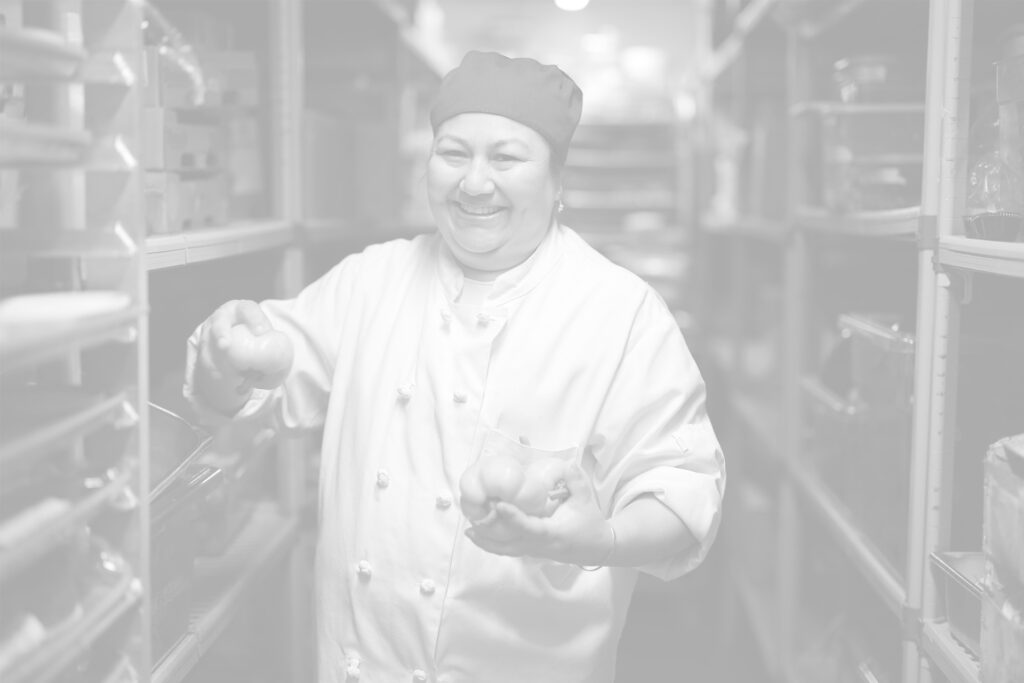


real talk:
Acceptance
Many working in the restaurant industry have questioned their career choice at some point, wondering if they should be doing something else.


REAL TALK:
Acceptance
Many working in the restaurant industry have questioned their career choice at some point, wondering if they should be doing something else. Like get a “real job,” one that’s 9-to-5, with benefits and weekends off. But, then again, that’s just not who they are. Regardless of what their families or people outside the industry might think, restaurant work IS their “real job.” Whether you’re a chef, server, bartender, or busser, there’s a career path in this industry, and it can be your career.
Here’s what Steven Goff, chef and owner of Tastee Diner in Asheville, has to say about accepting his career choice: “I went to school for welding, lasted about a month. Went to school for plumbing, lasted about a month. Went to school for HVAC, lasted about a month. Finally, I just accepted that this is what I do.”
Q: Why did you feel like you had to accept that restaurants could be a legitimate career choice?
A: Because it’s a hard industry. It’s a really hard industry. I mean, it’s a great industry. I love it, and it is a great place for people. I’ve been incarcerated before. I’ve had addiction issues before. I’ve been homeless before. But it’s the kind of industry that if you come in and you work hard, you can make something of yourself in it no matter what, no matter where you’ve been.
Everybody wants to work a 9-to-5 job, and that is not us. You know? But at the same time, we have more fun at work. We have a more colorful work area to be in. We have creativity involved. We have taking care of people involved.
Something I am always saying, whenever I get new staff is, “What industry are we in?” They might answer, “Cooking, because I run the kitchen mostly.” And it’s like, “No, we’re in hospitality. We’re making people happy. That’s what we do. And that should make us happy.”
“We’re in hospitality. We’re making people happy. That’s what we do. And that should make us happy.”

REAL TALK:
School vs. On-the-Job Experience
Many professionals have advanced in their careers without completing a culinary or hospitality program. They find on-the-job experience has been invaluable in their development.


REAL TALK:
School Training vs. On-the-Job Experience
Many professionals have advanced in their careers without completing a culinary or hospitality program. They find on-the-job experience has been invaluable in their development. And while there are advantages to formal training, some in the industry say they just learn better by doing.
When it comes to academic versus work experience, lodging professional Cintra Noel advises anyone considering hospitality to try it out first. She uses her own story as an example. Currently the front desk supervisor at TownePlace Suites in Wilmington/Wrightsville Beach, Noel has worked in lodging for 20 years. Initially, she wanted to be a chef. She worked in restaurants and even attended culinary school in California.
But when she became a parent, she began working for Marriott and never returned to restaurants. Her hotel roles have included guest services, billing, bookkeeping, and sales.
“I kind of got hooked jumping from different departments, learning those skills, then moving on,” she says.
Although she found her calling in lodging, she still had culinary school loans to repay. That’s why it’s important to try different things to see what fits you best, she says.
Q: What’s your advice to anyone considering hospitality as a career? Should they enroll in a hospitality program before working in the industry or gain experience first?
A: Before you actually spend a lot of money on college, which I have, I would actually have gotten a job first in the field and test it out and see if this is what I wanted to do. You can actually move up in this field, and then afterward, you could go and get your college degree. But test it out first.
I even tell my kids, “Try different things out. You don’t have to stay at one job, but see if this fits you.” My son wants to do baking. So, he got a job at the bakery and learned the skills. He’s still in high school, but he’s practicing. I was like, “Perfect. So now if you want to actually advance, you can go to college and actually do it.”
A lot of people I went to school with, they dropped out halfway through the program. They still had their school loans to pay, and they decided to take a different route.
“Try different things out. You don’t have to stay at one job, but see if this fits you.”


Find a Job

